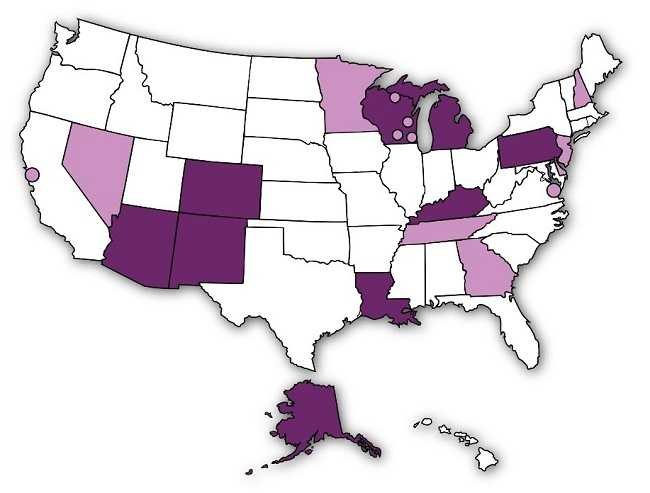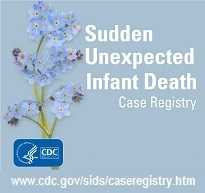SUID and SDY Case Registries
Learn about the Sudden Unexpected Infant Death Case Registry and the Sudden Death in the Young Case Registry.
Sudden Unexpected Infant Death (SUID) Case Registry
CDC’s Division of Reproductive Health supports SUID monitoring programs in 16 states and 2 jurisdictions, covering 30% of all SUID cases in the United States. Participating states and jurisdictions use data about SUID trends and circumstances to develop strategies to reduce future deaths. The SUID Case Registry builds on the National Center for Fatality Review and Prevention’s System and brings together information about the circumstances associated with SUID cases, as well as information about investigations into these deaths. Learn more about the SUID Case Registry [PDF – 197 KB].
Sudden Death in the Young (SDY) Case Registry
CDC and the National Institutes of Health collaborate on the SDY Case Registry, which expands the population of the SUID Case Registry to include children and adolescents. The SDY Case Registry was created to increase the understanding of the prevalence, causes, and risk factors for infants, children, and young adults who die suddenly and unexpectedly. Currently, 10 states or jurisdictions participate in the SDY Case Registry. Learn more about the SDY Case Registry [PDF – 100 KB].
Funded Grantees, 2017

CDC supports SUID monitoring at 18 grantee sites, covering 30% of all SUID cases in the United States. Alaska, Arizona, Colorado, Louisiana, Kentucky, Michigan, New Mexico, and Pennsylvania participate in the SUID Case Registry (dark purple).
Delaware, Georgia, Minnesota, Nevada, New Hampshire, New Jersey, the city and county of San Francisco, Tennessee, the Tidewater Region of Virginia, and Wisconsin (selected counties) participate in the SUID and SDY Case Registries (light purple).
SUID Prevention in Action: Grantee Success Stories
Changing Education Policies: A Story from Michigan
As part of their participation in the SUID Case Registry, the Michigan Public Health Institute (MPHI) analyzed their data and found an increase in infant deaths within families receiving child protective services. To address this issue, MPHI worked with the Michigan Department of Health and Human Services to develop an infant safe sleep training and a policy that requires all child protection workers (e.g. foster care, child protective services) to receive this training. In response to this policy, Michigan’s SUID Case Registry staff is conducting county-based, face-to-face, safe sleep trainings for every child welfare worker in the state. As a result of SUID Case Registry staff efforts, approximately 3,500 workers in all of Michigan’s 83 counties have been trained since October 2014. Additionally, Michigan passed the Infant Safe Sleep Act in 2014. This bill requires all birthing hospitals in the state to provide information and educational materials on infant safe sleep practices to new parents after the birth of their child.
Developing Partnerships: A Story from Louisiana
The Louisiana Department of Health, Office of Public Health, Bureau of Family Health’s participation in the SUID Case Registry has led to the development of new partnerships to promote safe sleep throughout the state, such as the Collaborative Improvement and Innovation Network (CoIIN) Safe Sleep Champion Hospitals initiative. Professionals participating in SUID Case Registry case reviews of infant deaths in 2013 recommended improving safe sleep education in hospitals. In response, Louisiana’s maternal and child health regional coordinators visited all the birthing hospitals in their state, shared data from the SUID Case Registry, and distributed information about the CoIIN initiative with maternal and child health administrators. As a result of this SUID Case Registry and CoIIN project, all 52 birthing hospitals in Louisiana have been recognized as Safe Sleep Champion Hospitals, signing on to carry out at least one new action related to policy change, staff education, patient education, or community outreach to promote the 2011 safe sleep recommendations issued by the American Academy of Pediatrics.
Targeting Safe Sleep Behaviors: A Story from New Jersey
New Jersey used its SUID Case Registry data to identify populations with higher risks of SUID that could potentially benefit from targeted prevention activities. The data showed that infants of teen mothers had higher rates of SUID in New Jersey, and that almost every mother of an infant in the Registry received prenatal care. In response to these findings, the New Jersey Department of Children and Families partnered with the New Jersey Department of Education and Department of Health and sponsored a safe sleep art contest in middle schools throughout New Jersey. Middle school students were selected because they are current babysitters and future parents. The winning submission was printed on a tote bag that was filled with safe sleep materials. The bags were distributed to programs that deliver prenatal care, including 20 federally qualified health centers, 17 Special Supplemental Nutrition Program for Women, Infants, and Children (WIC) Offices, 22 Aid to Families with Dependent Children Offices, and multiple home visiting programs.
- Page last reviewed: April 17, 2017
- Page last updated: April 17, 2017
- Content source:


 ShareCompartir
ShareCompartir
